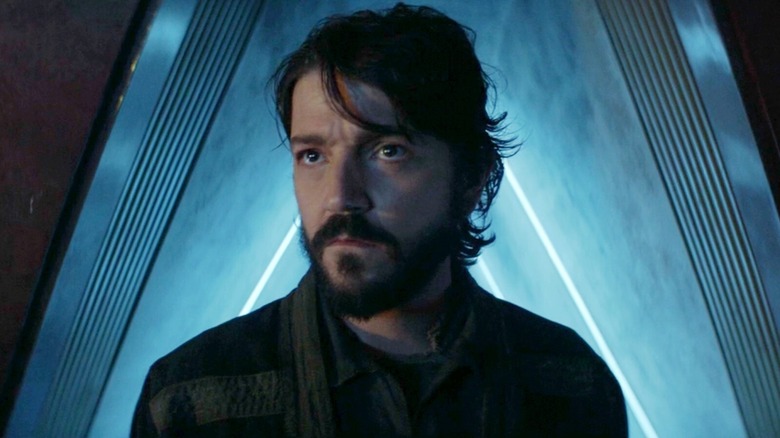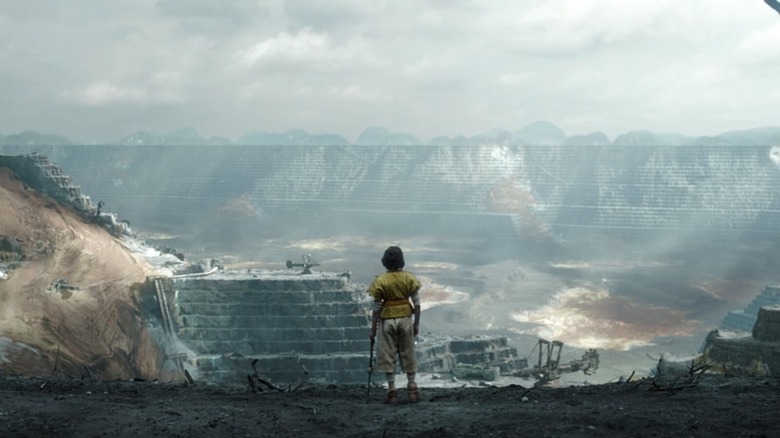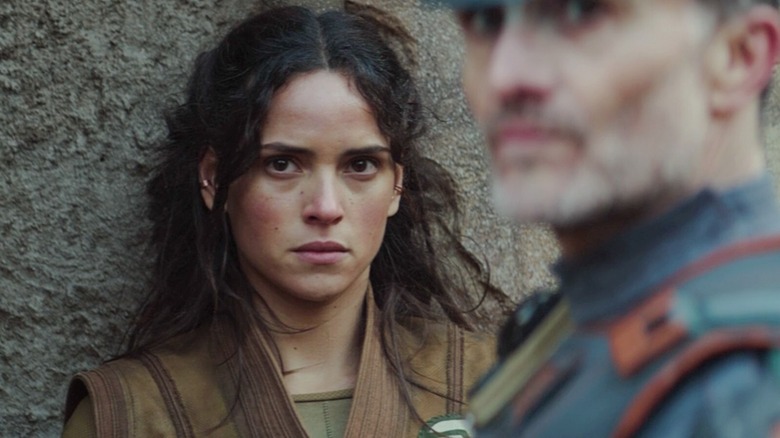Andor Is Like Les Miserables In Space, And That's A Beautiful Thing
It's not an exaggeration to say that "Andor" has been a project years in the making. The series was first announced back in 2018 — which feels like a lifetime ago — and the intervening years have been filled with enough hype, anticipation, and Vanity Fair features to excite even the most skeptical "Star Wars" fans. But even before "Andor" was a twinkle in Lucasfilm's eye, it felt like we'd been waiting forever for such a radical take on "Star Wars."
From the beginning, "Andor" was teased as a dramatically different "Star Wars" story, one that benefitted greatly from the big swing that "Rogue One" took back in 2016. Showrunner Tony Gilroy has been especially keen on managing expectations for the series: "Andor" is not the kind of "Star Wars" project that regurgitates everything we already know through cameos and Easter eggs. It's a series about a world on the brink of revolution, a slow burning espionage thriller, and an earnest character study for each member of its massive, "Dickensian" cast — all of which just happens to take place within the "Star Wars" galaxy.
That Dickens comparison in particular really put the tone of "Andor" into clearer perspective. And with the first three episodes of the series now available for everyone's viewing pleasure, the influences are clear. "Andor" is definitely giving off "A Tale of Two Cities" vibes, perhaps even a bit of "David Copperfield." But there's yet another 19th-century novel that "Andor" feels like a reflection of: Victor Hugo's "Les Misérables," if only for its earnest focus on the marginalized voices in that galaxy far, far away.
An ode to the little guys
One of the best things about "Andor" is its clear disinterest in retreading familiar ground with characters everyone recognizes. Look, I'm not the first "Star Wars" fan to bemoan the franchise's borderline fixation with the Skywalker saga. It's always going to be frustrating to watch such an expansive, diverse world be limited to the story of what is essentially their royal family. Even in stories that are meant to focus on the little people, the Skywalkers still find some way to pop up — and I love those guys, I really do, but there's no way the galaxy is that small.
"Rogue One" felt like a perfect antidote to the Skywalker fatigue, especially in hindsight. Barring the tasteful cameos from Darth Vader and Princess Leia — and support from established players like Bail Organa, Mon Mothma, and Saw Gerrera — "Rogue One" focused entirely a group of scrappy, unknown characters. They lived on the margins of the galaxy; they were essentially the forgotten heroes of the Rebellion. But the fight mattered to them as much as it mattered to people like Luke Skywalker — maybe even more. They enriched a world that's otherwise rendered as a playground for Jedi and Sith, and they made the Rebellion matter more than it had in a long time. "Rogue One" got exactly what made "Les Mis" so fascinating: when you understand the characters, you understand the world and the stakes. You care.
How Andor gets it right
"Andor" takes all of the above and absolutely runs with it. The series shines a light on characters that would otherwise be extras or even set dressing in an ordinary "Star Wars" project, and it doesn't pull away until you understand their motivation to some degree. Not unlike "Les Mis" — which dedicates whole chapters to tangential events and nameless characters — it tells its story through the eyes of everyday people.
The bureaucratic struggles of Syril Karn (Kyle Soller) and his overworked team feel pedestrian, almost banal, compared to literally anything else that could be happening in the galaxy. The bell-ringer on Ferrix doesn't even have a name (that we know of), but from his brief appearances in "Andor," we can feel his reverence for his craft, not to mention his importance. Even the quiet distrust building between Bix (Adria Arjona) and Timm (James McArdle) takes up a major chunk of screen time. It's not until much later, when things come to an explosive head in the series' third episode, that everything really clicks.
"Andor" knows better than to underestimate a single member of its ensemble. The Rebellion is a tapestry of moments, of people and choices — and the series really cares about how one informs the other. It might not make much sense at first. It might even take some getting used to. But there's a reason for every creative choice the series makes: you just need a bit of patience for the payoff. At least it's a show and not a 1,500-page book, right?
"Andor" is now streaming on Disney+.


